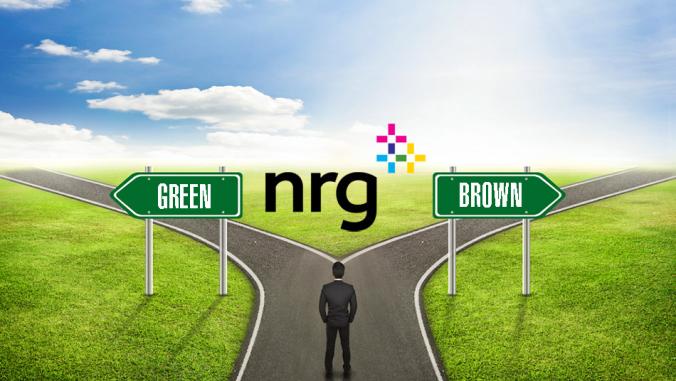Carbon is a terrible thing to waste
Transforming carbon emissions from fossil fuel generation is more than a business opportunity.

Wow.
If you read GreenBiz’s State of Green Business 2016 report cover to cover, as I did, you will both learn a lot and be impressed by the breadth and depth of technology-enabled economic opportunity arising out of society's drive towards sustainability.
The business proposition that green can be turned into gold never has been more true.
Far as I could tell, every innovation and new sustainable business initiative mentioned in the report, published last month, is beneficial to society at large (unlike, for argument's sake, corn-based ethanol). But all sustainability initiatives are not created equal in terms of their potential impact.
That is the question everyone in the sustainability field has to ask themselves: Are you just doing sustainability to be true to yourself — lightening, if you will, your personal and occupational carbon footprint so that you can sleep well at night — or are we, as a collective, "in it to win It" — "it" being the global fistfight against climate change, as Bobby Kennedy Jr. likes to call it?
When it comes to winning the fight against climate change, there are many "wants" but just a few "musts": We must get solar over every parking lot and on every roof that can handle it. We must severely reduce tailpipe emissions. We must give the developing world an electrification/connectivity alternative to the fossil-fuel-driven centralized grid system.
When it comes to winning the fight against climate change, there are many 'wants' but just a few 'musts.'
But the must I was looking for in GreenBiz’s report was found, lying unassuming, on page 30, posed as a rhetorical question:
Can carbon recycling ... put a dent in the 36 billion metric tons (emphasis added) of carbon dioxide released globally each year from burning fossil fuels?
We must find a way to get the vast majority of that 36 billion a year of CO2 out of the atmosphere, which means getting it out of our economic system. We either stop using fossil fuels (unlikely) or find an economic way to combust fossil fuels without emitting carbon (better). Transforming the carbon emissions from fossil fuel generation into an economic asset isn't just a good, green business opportunity; it is a moral imperative that should weigh heavily on everyone who produces or consumes fossil fuels — which, of course, is all of us.
Coal without carbon?
We can't solve the climate problem solely by getting the carbon out of coal, but if we don't get the carbon out of coal, we have no chance of winning the fight against climate change.
The 36 billion tons was referenced in a piece on the trend towards carbon recycling. Even though I have been involved in carbon capture for many years, I had not heard the term "carbon recycling" before reading the State of Green Business.
Over the past few years I have watched the terminology morph from "CCS" (“carbon capture and storage” or “carbon capture and sequestration”) to "CC-EOR" (“carbon capture and enhanced oil recovery”) to "CCUS,” which I believe is the American government's current preferred term for "carbon capture, utilization and sequestration." I have seen the idea of turning waste carbon into an economic asset referred to as carbon "materialization" or carbon "beneficiation," but now GreenBiz has anointed it "carbon recycling."
All this semantic progression is borne of the painful realization that there is not going to be a price on carbon that creates a market-driven incentive for the energy industry to bury its carbon waste deep in the ground.
Which means that we desperately need to find an economic use for waste carbon.
The concept of "carbon recycling" is good, but I am not sure I like the term. It triggers in my mind an association with the recycling of aluminum cans that has been a part of our everyday lives since the 1970s, but is seen by most people as a societal obligation — a good deed of inconsequential economic value — rather than as a meaningful for profit opportunity.
And, as a result, not everyone recycles and private-sector companies don't push it. There are recycling businesses that have made a good profit over the years but certainly none of them that I know of has grown into Fortune 50 companies. It's 2016, for goodness sake, and we are still allowing most of society's solid waste to turn into methane in landfills.
We need more than the marginal economics of recycling when it comes to carbon. We need carbon to become a big business, with meaningful bottom-line impact, so that the energy companies that produce fossil fuels and the electricity companies that burn them shift their business models — and their production technologies — to enable carbon harvesting (a term that I just invented).
For this to happen at real scale, rather than at the CSR-science-project-pretty-picture-in-the-back-of-the-annual-report scale, these companies need to be motivated principally by a desire to reap the economic benefit of their carbon "assets," with the environmental benefit of keeping that carbon out of the atmosphere as a positive side effect inuring to society.
This means that beyond focusing on how to capture and separate waste carbon in the largest and most economic way possible, we need to figure out how we adhere that CO2 compound molecule to other non-carbon molecules in a manner that yields a product that our capitalist society is willing to pay for. Moreover, given the massive amount of carbon emissions we generate, this new carbon product cannot be a "specialty" product. It must be a building material or other product that is used by society in very large volumes.
A breakthrough around the corner
Sticking with DOE terminology, CCUS needs to be a key area of R&D concentration for both the public and private sectors. Julio Friedman, who until recently headed the DOE efforts in this area and probably knows more about the potential for near-term innovation in CCUS than any other human on the planet, is cautiously optimistic that a breakthrough is around the corner.
But he laments the relative indifference to CCUS, not only to the energy companies that might benefit from a new asset stream but also a large segment of the environmental community — people who undoubtedly would rather see coal-fired generation relegated to the dustbin of history than to save it by effectively addressing the carbon problem.
Julio Friedman, who probably knows more about the potential for near-term innovation in carbon capture than any other human on the planet, is cautiously optimistic that a breakthrough is around the corner.
With industry gone AWOL on this problem, we have to look for "carbon entrepreneurs" to save the day. To incent these plucky inventors — beyond the "base" incentive that they have to save the planet — in a financial sense, there has been a resort to the "prize" method of inducement for technological advancement.
Several years ago, Sir Richard Branson announced the $25 million Virgin Earth Challenge, a multi-year carbon-capture competition that has progressed to a second round. Just last year the X Prize Foundation announced the $20 million NRG Cosia Carbon X Prize, with a focus both on carbon capture (from both coal and natural gas emissions) and use at scale. And there likely are others.
So if the efforts of our best and most experienced engineers working in industry will continue to be directed almost exclusively towards figuring out the best way to extract fossil fuels from the ground so that they can be combusted, then hopefully the legion of idealistic young students rising through our engineering schools will organize themselves to reach for one of these carbon prizes and, by so doing, win millions of dollars, achieve reputational immortality and, along the way, save the world.
So, wherever you sit in the sustainability value chain, spare a thought for this fact: 36 billion tons of CO2 a year — that's a lot of carbon asset to waste on the atmosphere.





